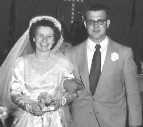I am in the (long) process of writing a book about Mother Layne's Hospitality Home in San Diego, California. The Home ministered to military men and women from 1941 to 1975. More than 650,000 people passed through its doors during that time frame. It was sponsored by the Layne Foundation. I have quite a lot of documentation about the Foundation, the staff of the Home, and those who benefited from the Hospitality Home - and my task is to effectively present all of it to the reading audience. My husband Howard is helping me in all of it, of course.
I've already put some stuff online at www.spaciousskies.us/HospHome/.
I've recently become aware of studies showing that each of us can be placed within age-ranges, called "generations," based on the year in which we were born. Furthermore, the things going on in the world during our formative years have shaped how we respond to life. I think of "formative years" as being ages 4 through 12. Using myself as an example, my formative years were those of the World War II years, 1938-1946. So I fit nicely into the "Traditional" generation, those born in 1906-1945. The one-word summary of us Traditionals is "loyalty."
Our children were born between 1946 and 1964, so they are "Baby Boomers." The one-word summary of Baby Boomers is "optimism."
Most of our grandchildren were born between 1965 and 1980, and are therefore in what is called "Generation X." The one-word summary for this group is "skeptical." They want to know "what does this mean to me?"
The youngest group, the Millennials, are those born in 1981 until now. Their one-word summary is "realistic." Four of our grandchildren and all of our great-grandchildren are in this group. When Howard and I moved to rural southeast Alaska in 1999, we had no home phone during our first year. I told one of our granddaughters about that and she looked dismayed and said, "I don't think I could live that way!"
The age ranges are just guidelines and they can overlap. The "one-word summary" describes each group's attitude to the institutions in society, such as education, religion, government and the military. (I wonder if all of this applies around the world, or just to American society ... my guess is that it's about the same everywhere.)
How does all this affect my writing process? Many of the people who actually went to the Hospitality Home through the years are now deceased or aging fast, so I won't have much of an audience if I target only the Traditionals. I'm going to need to keep the Baby Boomers in mind, and make my focus an optimistic one. Generation Xers will look for ideas they can personalize and make them fit into their belief system. It has been noted that relationships often "skip" a generation - that is, Traditionalists relate to GenX, and Baby Boomers relate well to the Millennials. That makes me hopeful that my targeting the GenX group will be fruitful.
Bridging the gap between my generation and that of my younger grandchildren and my great-grandchildren is an interesting process too ... they cannot envision life without the computer, cell phones, TV, the internet, cars, planes, and so on. What happened in our youth is what they view as ancient history and therefore is quite probably of little value. So my challenge will be to portray the lives of their grandparents and great-grandparents as real.
Oh my goodness - I think I just talked myself out of the whole project! HELP!!!!
Tuesday, September 25, 2007
Subscribe to:
Post Comments (Atom)




No comments:
Post a Comment